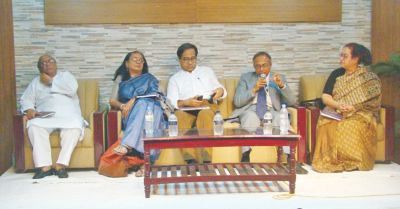News >> Literature
Nazrul unfettered
 01 Mar, 2013
01 Mar, 2013
A discussion on Unfettered, the English translation of Kazi Nazrul Islam's Bandhonhara, was held at Indira Gandhi Cultural Center on 16 February. Prof Rafiqul Islam, Prof Fakrul Alam, Prof Firdous Azim, Prof Razia Sultana Khan and former ambassador Mahbubul Alam talked about various aspects of the book.
The English translation, edited by Prof Niaz Zaman, has been done by a team of The Reading Circle (TRC) comprising Tanveerul Haque, Asfa Hussain, Shirin Hasanat Islam, Ayesha Kabir, Jackie Kabir, Saeeda Khan, Shahruk Rahman and Niaz Zaman. Published by Nymphea, the book is sponsored by Standard Chartered Bank.
All the speakers congratulated the TRC members on undertaking the critical task of translating the work, which depicts Nazrul's early life as a soldier with the 49th Bengal Regiment in the First World War. Prof Islam said that it was an important novel as it was one of the first works to use 'Promito Bangla'. An early work by Kazi Nazrul Islam, the novel is written in the form of eighteen letters.
Prof Firdous Azim, an eminent scholar in gender studies, said that the novel was of interest to her because it was written in the 1920s, a period similar to the phase Bangladesh is passing through today. She thanked Prof Niaz Zaman for doing a commendable job of editing and bringing so many different writings into one form. There are few other fictions in the epistolary form, 'Strir Potro' and 'Pamela' being two deserving mention. Azim said she saw Kazi Nazrul Islam in the role of the artist as a young man in Unfettered.
In his remarks, Prof Fakrul Alam analyzed the novel as being Kazi Nazrul Islam's self portrait, where the poet depicts himself as a rebel trying to break free of the influence of Tagore. Nazrul had deep knowledge of Hinduism and was multilingual as he used Urdu and Persian in his writing. Prof Alam added that he found Byron's influence in Nazrul Islam's writing.
Prof Razia Sultana Khan said the work was a novel of triangular love, a good friendship between three men. Since the book was written during the First World War, she had expected it to be about war and killings but was happy to discover that it was a novel about love and relationships. As a reader she felt the same emotions of anger, sadness and joy as did the characters in the work.
Writer and former diplomat Mahbubul Alam threw light on the only regiment comprising Bengalis in colonial times. The regiment was known as the Bangla Paltan. Today's Bangladesh army, he stated, might be regarded as a continuation of that paltan.
Shahrukh Rahman thanked the IGCC for making it possible for The Reading Circle to organise the program at its premises.
Source: Daily srar

